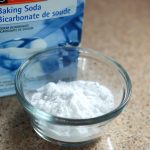Baking soda offers potential anticancer effect, multiple studies reveal
 (NaturalHealth365) Sodium bicarbonate, better known as baking soda, has been used for decades as a first line of defense against every kind of ‘acidic’ health problem – including cancer. Naturally, the question remains – is there any proof that baking soda is a defense against cancer or any other chronic dis-ease?
(NaturalHealth365) Sodium bicarbonate, better known as baking soda, has been used for decades as a first line of defense against every kind of ‘acidic’ health problem – including cancer. Naturally, the question remains – is there any proof that baking soda is a defense against cancer or any other chronic dis-ease?
History has much to teach us about natural healthcare. In a booklet titled Arm & Hammer Baking Soda Medical Uses, published in 1924, Dr. Volney S. Cheney explains his clinical successes in using sodium bicarbonate to treat both the common cold and flu. His comments are actually quite remarkable …
“In 1918 and 1919, while fighting the ‘flu’ with the U. S. Public Health Service it was brought to my attention that rarely anyone who had been thoroughly alkalinized with bicarbonate of soda contracted the disease, and those who did contract it, if alkalinized early, would invariably have mild attacks.”
Sodium bicarbonate has been and still is used to make urine less acidic. This helps the kidneys get rid of uric acid and is used medically to prevent gout and kidney stones. Even athletes use sodium bicarbonate to improve endurance. In fact, cells that have enough bicarbonate consume more energy at rest – so they are better able to transport glucose and lactate.
Can baking soda help cancer patients heal naturally?
Sodium bicarbonate has a range of positive effects on breast cancer in animals, including increasing tumor pH, reducing lymph node involvement, and inhibiting metastases. Moreover, baking soda has been demonstrated to suppress cancerous growths, regulate the pH balance of cells and tissues, and elevate cell voltage.
By improving oxygen levels, baking soda can help prevent the development of cancer and even reverse malignant cells back to a healthy state. Weak cancer patients are often advised to take sodium bicarbonate, as it can help to improve muscle cell function after only a few days of treatment.
How does baking soda prevent cellular damage?
The pH level of the fluids within our bodies plays a critical role in the functioning of every cell. When the body becomes chronically over-acidic, it starts to corrode tissue, which can ultimately disrupt all cellular activities and functions. In short, over-acidity can interfere with life itself and is considered to be one of the fundamental causes of cancer.
Every cell in our bodies requires oxygen to thrive and remain healthy. When the pH level is low, there is less oxygen available for the cells to use. This phenomenon is comparable to what happens when acid rain alters the chemistry of lakes; the fish in the lake suffocate because the oxygen has bound up with other molecules and is no longer available.
However, if the oxygen level is raised, the lake will come back to life. Similarly, by increasing the amount of oxygen available to the cells, the body can return to a state of health and vitality.
How does ‘alkalinity’ help to prevent disease?
Maintaining a healthy pH range requires making necessary changes to our lifestyle and diet, which will help protect us over the long term. Using sodium bicarbonate can provide a jumpstart toward increasing alkalinity and is a natural medicine that should be treated with respect. It’s important to keep in mind that if our pH levels deviate too far from the acceptable range, our risk for disease increases significantly.
For a long time, drinking bicarbonate of soda dissolved in water has been a popular remedy for a range of health issues, including arthritis, indigestion, heartburn, and infections. Traditionally, sodium bicarbonate has been used as an antacid.
It’s worth noting that our body produces its own bicarbonate thanks to the work of our pancreas. Bicarbonate helps to neutralize acids that come from the stomach, creating an environment that is conducive to the effectiveness of pancreatic enzymes.
A word of caution – before using baking soda
One of the precautions in using sodium bicarbonate is its sodium content, and it is thus advised for patients with high blood pressure to check with their experienced healthcare provider before trying this remedy. Sodium bicarbonate, along with citrate and phosphate salts, does not raise blood pressure to the extent that sodium chloride does.
Table salt is a refined salt containing about 97 to 99 percent sodium chloride. We know for a fact that processed (‘table’) salt does raise blood pressure in only those sensitive to it. But, obviously – hypertension is caused by much more than just the use of table salt.
A study on mineral water containing sodium bicarbonate confirmed the absence of any effect on elderly individuals’ blood pressure. But, as usual, consult with a trusted healthcare provider – to discover the safest way to use sodium bicarbonate – based on individual needs.
Stop Cancer Naturally: To learn more, order the Stop Cancer Docu-Class, created by yours truly, Jonathan Landsman and discover the best ways to avoid the risk of cancer from many of the top experts in integrative cancer care.
Sources for this article include:











